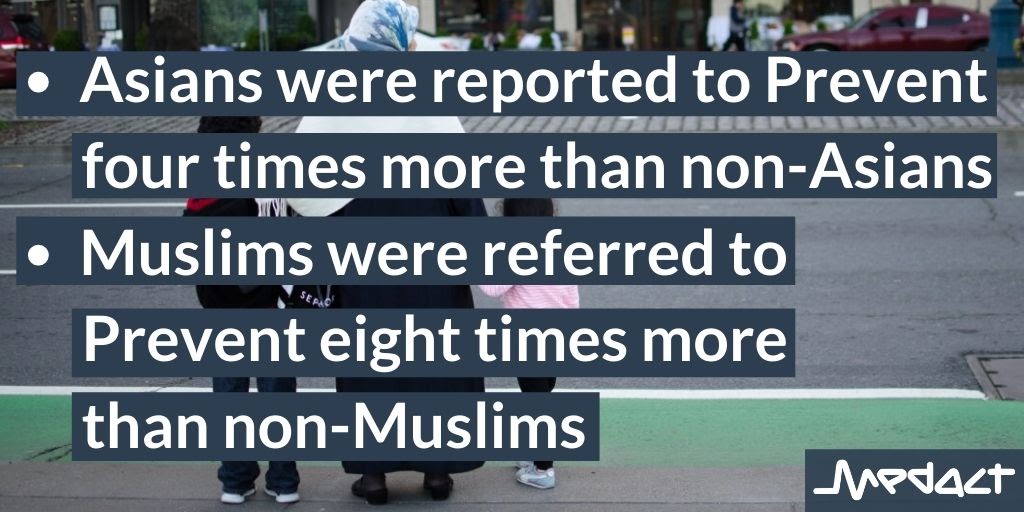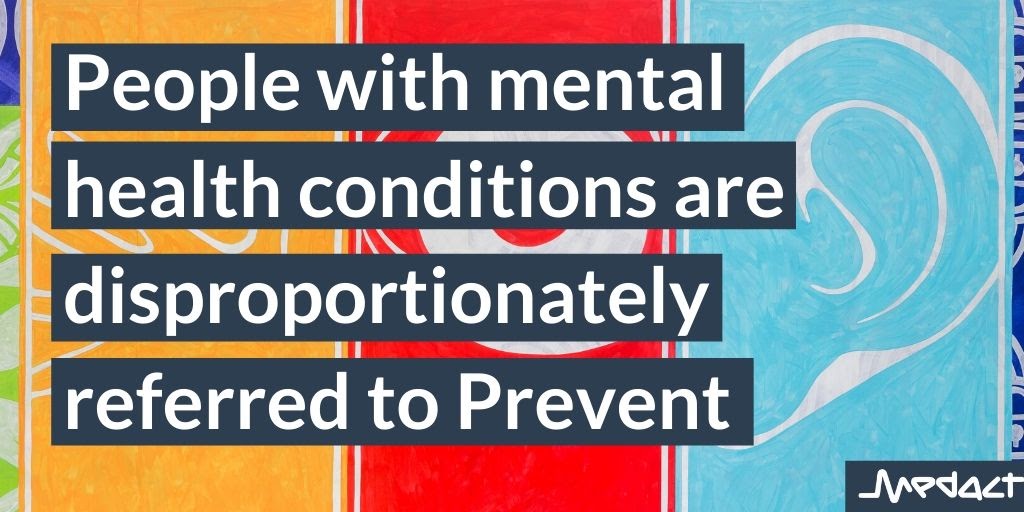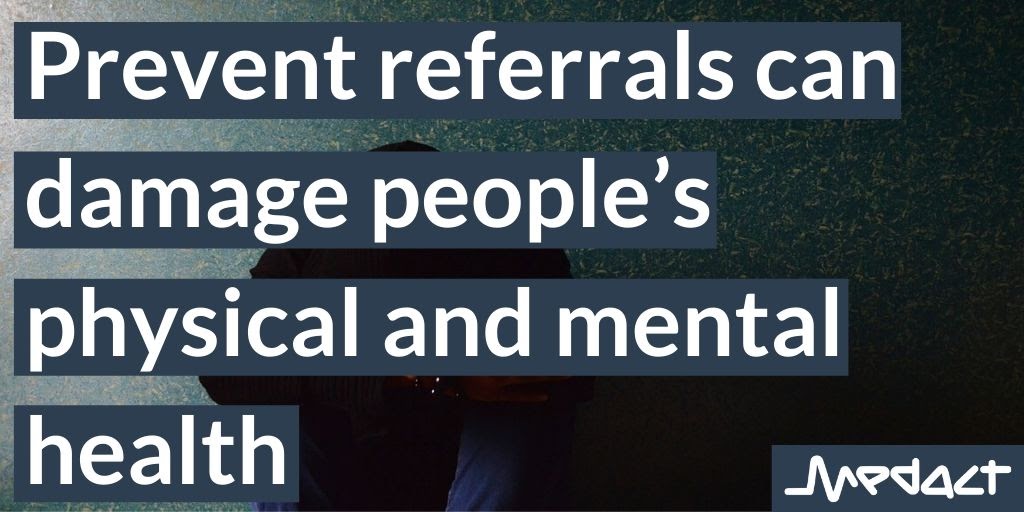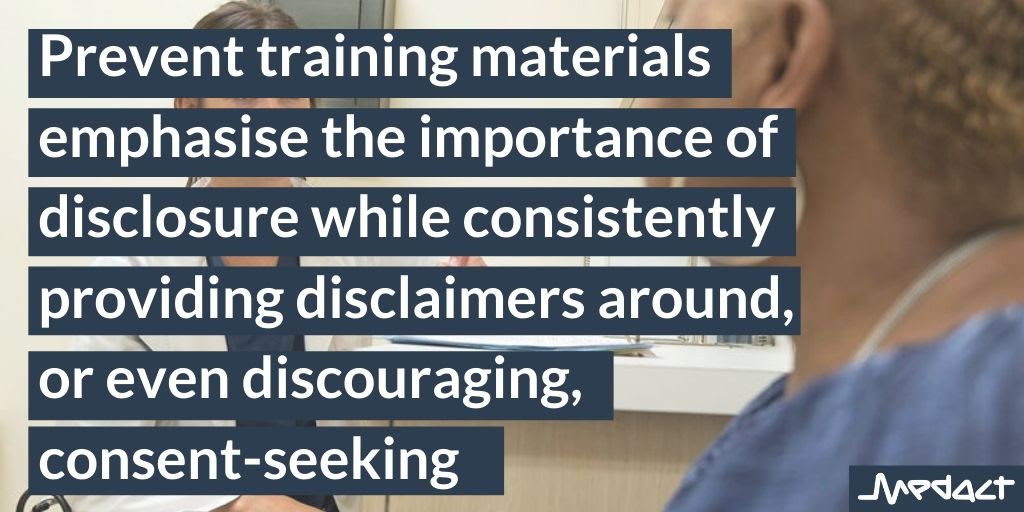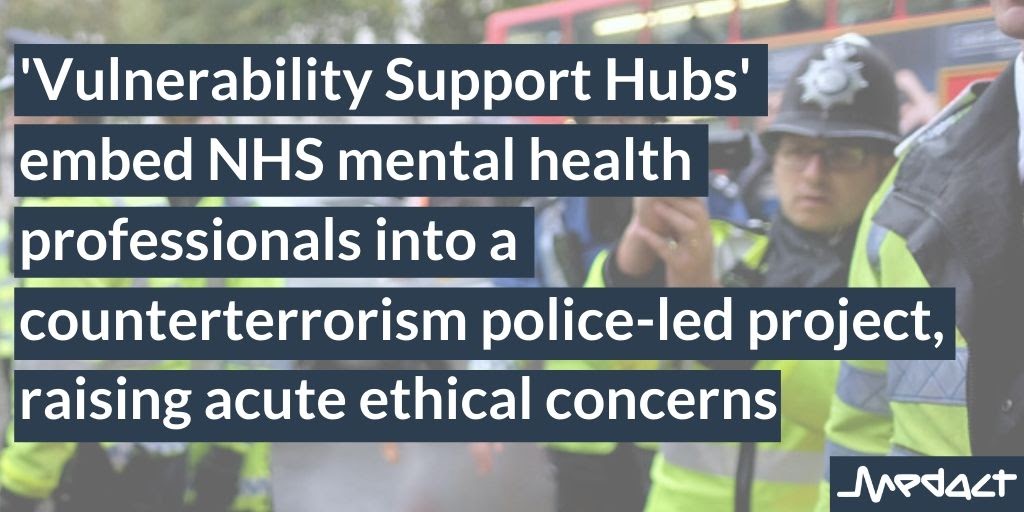Some key findings from our new report on the Prevent duty - a thread.  https://abs.twimg.com/emoji/v2/... draggable="false" alt="⬇️" title="Pfeil nach unten" aria-label="Emoji: Pfeil nach unten">
https://abs.twimg.com/emoji/v2/... draggable="false" alt="⬇️" title="Pfeil nach unten" aria-label="Emoji: Pfeil nach unten">
Firstly, you can find the report & a few key findings here.
Thanks @khandossos
& @The_Showroom_ for the image https://www.medact.org/2020/resources/reports/false-positives-the-prevent-counter-extremism-policy-in-healthcare/">https://www.medact.org/2020/reso...
Firstly, you can find the report & a few key findings here.
Thanks @khandossos
& @The_Showroom_ for the image https://www.medact.org/2020/resources/reports/false-positives-the-prevent-counter-extremism-policy-in-healthcare/">https://www.medact.org/2020/reso...
1. Racial & religious minorities are disproportionately reported to Prevent.
We argue that this is a result of:
- Racial biases of the & #39;radicalisation& #39; evidence base & risk assessment tools underlying Prevent
- Encouragement of health workers to rely on & #39;gut instinct& #39;
We argue that this is a result of:
- Racial biases of the & #39;radicalisation& #39; evidence base & risk assessment tools underlying Prevent
- Encouragement of health workers to rely on & #39;gut instinct& #39;
A side note - @Tarek_Younis_ explained succinctly at our launch yesterday the & #39;colour-blindness& #39; pervading Prevent & its current logic https://twitter.com/raceandhealth/status/1278751711612620800">https://twitter.com/raceandhe...
2. People with mental health conditions are disproportionately referred to Prevent.
This can be explained by:
- Govt claims that mental health is an indicator of risk in being drawn into terrorism, despite a lack of robust evidence
- Societal stigma around mental health
This can be explained by:
- Govt claims that mental health is an indicator of risk in being drawn into terrorism, despite a lack of robust evidence
- Societal stigma around mental health
As @SophieCorlett from @MindCharity noted in an article earlier this week in the Guardian, which echoes some of what @MayuDeshp talked about at our report launch yesterday.
3. In fact, in the course of our research, we found a number of concerning cases in which a Prevent referral actually led to an individual & their family members developing physical and mental health conditions. #PreventHarmsHealth
You can read these anonymised case studies in our report, but one example is of the referral of a 9-year-old boy.
4. Through interviews and focus groups with health workers across the country, we also found that Prevent can:
- Erode trust between patient & practitioner, through the undermining of confidentiality
- Indirectly discourage consent-seeking practices
- Erode trust between patient & practitioner, through the undermining of confidentiality
- Indirectly discourage consent-seeking practices
In some cases, this erosion of trust after a referral led to an interruption in patient treatment, due to patients disengaging from care - which had knock-on effects on health.
5. Prevent alongside secretive & #39;Vulnerability Support Hubs& #39; - which embeds NHS mental health professionals into a counterterrorism police-led project - raises concerns about the securitisation of mental health
6. From the evidence we found, we believe it is imperative that the government repeals the Prevent duty in the NHS
If you& #39;re a health worker and interested in challenging Prevent & other securitising measures in healthcare, join us on 13 July https://www.medact.org/event/prevent-duty-in-nhs-july-planning-meeting/">https://www.medact.org/event/pre...
If you& #39;re a health worker and interested in challenging Prevent & other securitising measures in healthcare, join us on 13 July https://www.medact.org/event/prevent-duty-in-nhs-july-planning-meeting/">https://www.medact.org/event/pre...
And sign up to our & #39;Securitisation of Health& #39; mailing list to receive updates & info on how you can get involved
End of thread https://abs.twimg.com/emoji/v2/... draggable="false" alt="🚪" title="Tür" aria-label="Emoji: Tür"> https://www.medact.org/project/securitisation/">https://www.medact.org/project/s...
https://abs.twimg.com/emoji/v2/... draggable="false" alt="🚪" title="Tür" aria-label="Emoji: Tür"> https://www.medact.org/project/securitisation/">https://www.medact.org/project/s...
End of thread

 Read on Twitter
Read on Twitter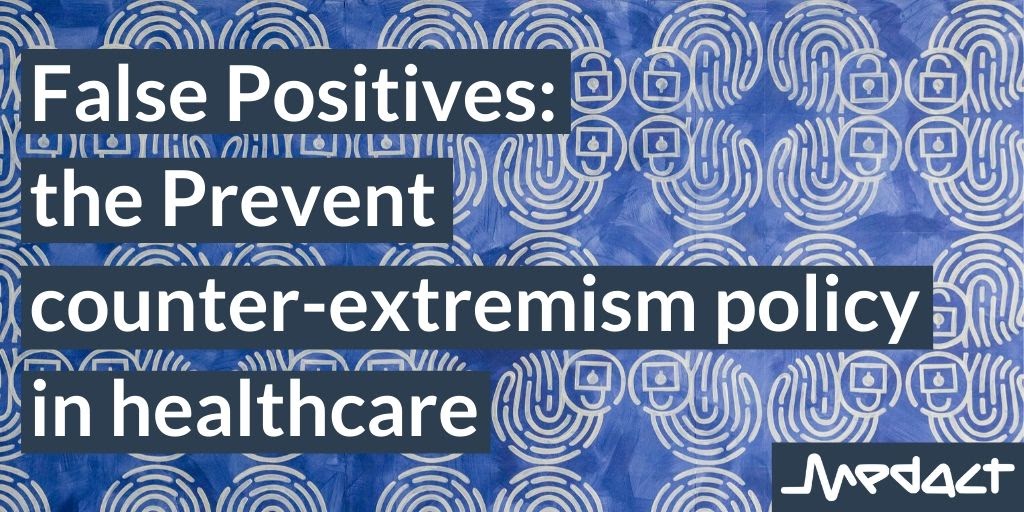 Firstly, you can find the report & a few key findings here. Thanks @khandossos& @The_Showroom_ for the image https://www.medact.org/2020/reso..." title="Some key findings from our new report on the Prevent duty - a thread. https://abs.twimg.com/emoji/v2/... draggable="false" alt="⬇️" title="Pfeil nach unten" aria-label="Emoji: Pfeil nach unten">Firstly, you can find the report & a few key findings here. Thanks @khandossos& @The_Showroom_ for the image https://www.medact.org/2020/reso..." class="img-responsive" style="max-width:100%;"/>
Firstly, you can find the report & a few key findings here. Thanks @khandossos& @The_Showroom_ for the image https://www.medact.org/2020/reso..." title="Some key findings from our new report on the Prevent duty - a thread. https://abs.twimg.com/emoji/v2/... draggable="false" alt="⬇️" title="Pfeil nach unten" aria-label="Emoji: Pfeil nach unten">Firstly, you can find the report & a few key findings here. Thanks @khandossos& @The_Showroom_ for the image https://www.medact.org/2020/reso..." class="img-responsive" style="max-width:100%;"/>
